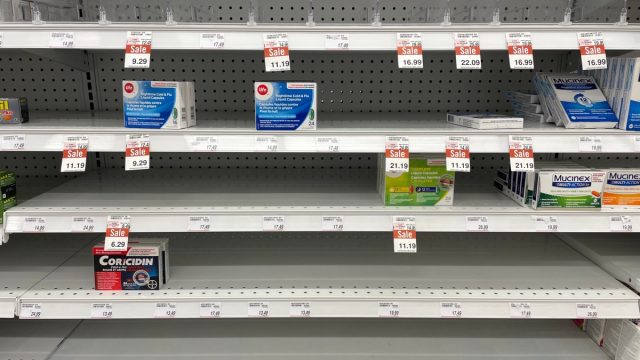The FDA Gives a Sobering New Update on Medication Shortages, Including Two Diabetes Drugs
Eli Lilly and Co's Mounjaro and Trulicity are the latest medications added to the shortage list.

The Food and Drug Administration's medication shortage list on Thursday got a little longer, as Eli Lilly and Co's Mounjaro, a popular new diabetes injectable, and Trulicity, another diabetes drug by the same company, were identified as running low, according to Reuters.
This growing list of medication shortages is a sobering reminder that the supply shortages exacerbated by the global pandemic, and high demand for medicines due to a growing number of illnesses, like RSV and Strep, are still disrupting people's lives—and jeopardizing their health.
"Drug shortages can pose a significant threat to public health as they can result in delayed treatment for patients, medication rationing, and in some cases, treatment being denied because of the lack of important drugs," says the Mayo Clinic.
When it comes to Mounjaro specifically, the FDA pointed out that the "dynamic nature of this new product launch"—it comes in many doses—makes it susceptible to shortages. However, some doses remain available.
RELATED: 4 Medication Swaps to Ask Your Doctor About Now
"We do expect to see intermittent delays at wholesalers and pharmacies in receiving some Mounjaro doses," Chief Financial Officer Anat Ashkenazi said in a conference call with analysts on Tuesday, Dec. 13.
The Recent Medication Shortages are Worrying Patients and Professionals

Medication shortages are being reported all over the world. Companies like Teva, Hikma Pharmaceuticals, and Sandoz reported shortages of some key brands.
Certain antibiotics, cancer drugs, and emergency care medications are all facing lows. Tamiflu was running low in Utah, for example.
Drug Shortages are "Not New" but Have "Increased," Says Expert
There can be a variety of reasons for medication shortages. Some common causes include:
- Manufacturing delays or production problems: These can be caused by issues such as quality control problems at a manufacturing facility, raw material shortages, or unexpected increases in demand.
- Supply chain disruptions: Natural disasters, transportation delays, or other logistical issues can disrupt the supply chain and make it difficult to get medications to where they are needed.
- Limited competition: If there are only a few manufacturers producing a particular medication, a problem at one of these facilities can lead to a shortage.
- Changes in demand: Sudden changes in demand for a particular medication, such as might be seen during a pandemic, can lead to shortages.
- Regulatory issues: Sometimes, regulatory issues can cause delays in the production or distribution of medications.
It's worth noting that medication shortages are not a new phenomenon and have been occurring for many years. However, the COVID-19 pandemic has exacerbated existing shortages and caused new ones to occur.
"Drug shortages are not new to healthcare, but really over the last two years with the COVID-19 pandemic, these shortages have really exposed the vulnerability of our global drug supply chain," said Dr. Mary Gilmer, director of Pharmaceutical Supply and procurement for Mayo Midwest, at a panel discussion held this summer.
"And these drug shortages continue to remain high despite decades of continued and increased awareness, effort, and significant resource investment in these drug shortage programs at the highest level."
As for why exactly this is happening, she said: "They include the supply and demand considerations and challenges, and we've seen with COVID, natural disasters like hurricanes, even including issues with manufacturing….this could be the raw material shortage or even the staffing challenges that manufacturing plants are experiencing as a result of the pandemic. And then certainly we can't ignore any kind of business and regulatory changes as a result of profit or market analysis where manufacturers may decide to end a product."
"There are high levels of stress and frustration for everyone involved when it deals with shortages," she added.





















